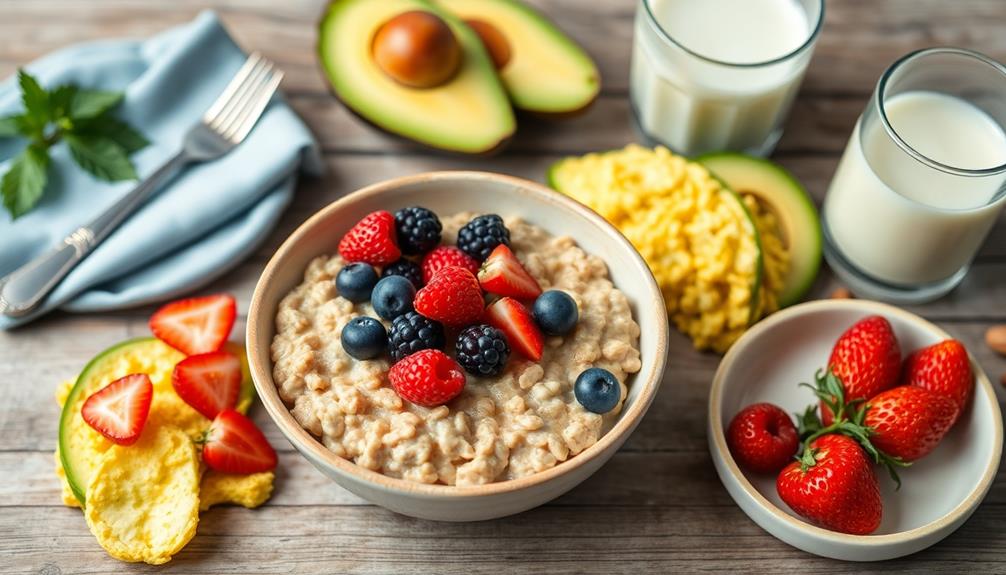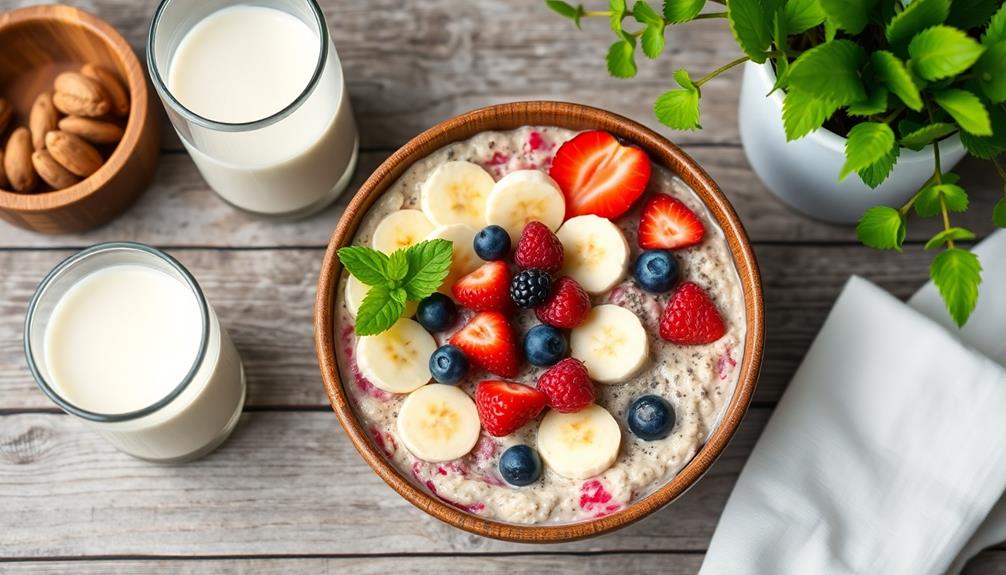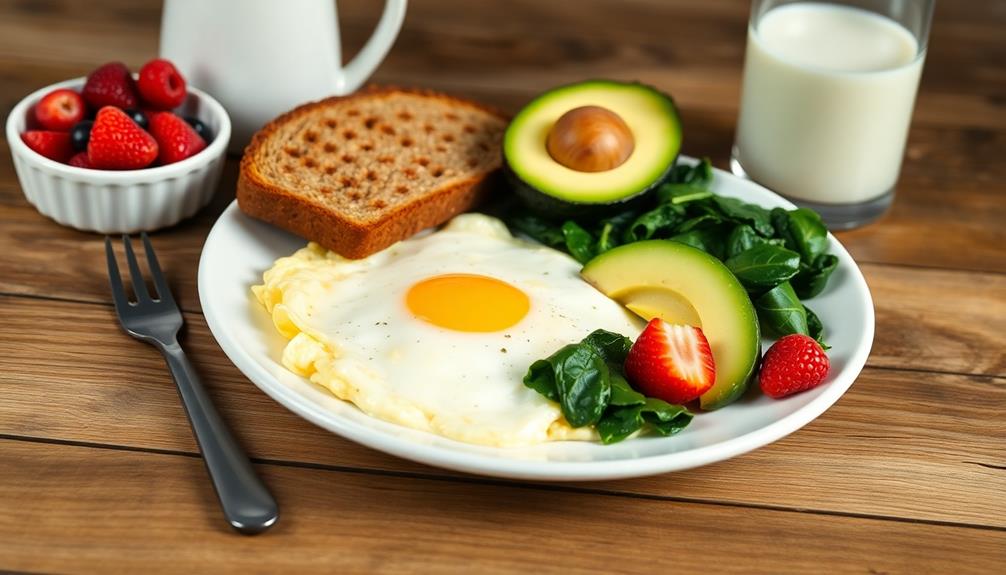A healthy breakfast for diabetics is essential for managing blood sugar levels. Start your day with whole grains like oatmeal or whole grain toast, pairing them with protein-rich foods like Greek yogurt or eggs. Incorporating high-fiber options, such as chia seeds or berries, can help slow carbohydrate absorption and keep you feeling full. Don't forget healthy fats; avocado on toast is a great choice. Meal prepping simple options ahead of time can save you effort in the morning. By making these smart food choices, you'll be on your way to better blood sugar control while discovering even more valuable tips.
Key Takeaways
- A balanced breakfast should include healthy carbohydrates, protein, and healthy fats to regulate blood sugar levels effectively.
- High-fiber foods like oatmeal and chia seeds slow carbohydrate absorption, promoting satiety and stable blood sugar.
- Greek yogurt, eggs, and cottage cheese are excellent protein-rich options that help curb hunger and stabilize blood sugar.
- Low glycemic index foods, such as whole grains and berries, prevent rapid spikes in blood sugar throughout the day.
- Meal prep nutritious options like overnight oats or chia seed pudding for convenient, diabetes-friendly breakfasts.
Importance of Breakfast for Diabetes
Why is breakfast so essential for managing diabetes? Skipping breakfast can lead to unstable blood sugar levels, increasing the risk of spikes later in the day.
When you eat a balanced breakfast, you help regulate your blood sugar after fasting overnight, which is vital for diabetes management. A meal that combines carbohydrates, protein, and healthy fats not only enhances your metabolic function but also sets the tone for your food choices throughout the day.
Research shows that a breakfast rich in healthy fats and moderate in protein can lower your fasting blood sugar levels and improve A1C readings. This means you're not just starting your day right; you're also working to prevent complications associated with type 2 diabetes.
Regularly consuming breakfast is linked to fewer carbohydrate cravings, allowing you to make healthier food choices later on.
Key Components of a Healthy Breakfast
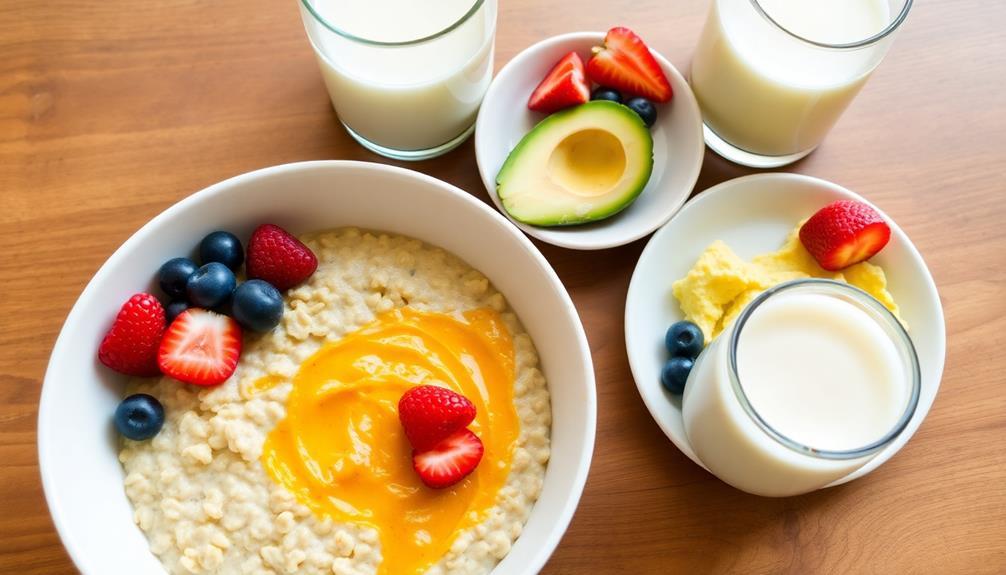
A balanced breakfast plays a significant role in managing diabetes, and understanding its key components can help you make better choices. To start, focus on incorporating healthy carbohydrates, particularly whole grains, which provide essential nutrients and support blood sugar control. Aim for low glycemic options that release energy slowly, preventing rapid spikes in blood sugar.
Next, don't forget about fiber. High-fiber foods like oatmeal or whole-grain bread can slow carbohydrate absorption, helping you meet the recommended 25-30 grams of fiber daily. This not only aids in blood sugar control but also promotes satiety, so you feel full longer.
Protein is another critical component. Including protein-rich options such as Greek yogurt, eggs, or cottage cheese can help curb hunger, with a goal of about 15-30 grams per meal.
Best Breakfast Foods for Diabetics
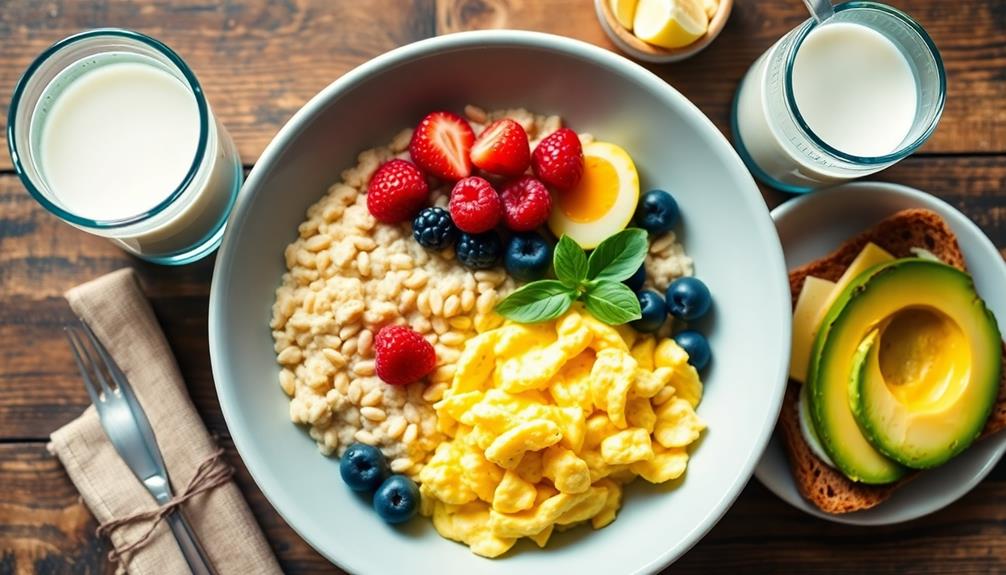
Start your day off right by choosing breakfast foods that support blood sugar management and overall health. Here are some excellent options that are not only delicious but also packed with nutrients to help you manage diabetes effectively: Opt for whole-grain cereals or oats, which provide a steady release of energy and help prevent blood sugar spikes. Pair them with a source of protein, such as eggs, Greek yogurt, or a handful of nuts, to further stabilize glucose levels. Incorporating these staples into your routine can create a balanced, healthy breakfast for diabetics while jumpstarting your day with sustained energy and nutrition. Additionally, consider incorporating fresh fruits like berries, which are lower in sugar and high in fiber, to add natural sweetness and essential vitamins to your morning meal. Don’t forget healthy fats, such as avocado slices or a sprinkle of chia seeds, which can further contribute to feeling full and maintaining stable blood sugar levels. Creating a habit of enjoying a healthy breakfast for diabetics can set a positive tone for the rest of the day, keeping you energized and nourishing your body effectively.
| Breakfast Food | Benefits |
|---|---|
| Greek Yogurt with Berries | High in protein (20.4g) and aids in blood sugar control. |
| Eggs | A powerhouse of protein (6.3g) with low calories, keeping blood sugar stable. |
| Chia Seed Pudding | High in fiber (9.8g) and low in carbs (12g), promoting satiety. |
| Oatmeal | Contains soluble fiber to help lower blood sugar levels. |
| Avocado Toast | Delivers healthy fats and essential nutrients to stabilize blood sugar. |
Incorporating these foods into your morning routine can lead to a healthy breakfast that keeps you satisfied and energized throughout the day. Whether you prefer Greek yogurt topped with berries or a hearty bowl of oatmeal, these options are all great ways to start your day while keeping your blood sugar in check.
Low-Carb Breakfast Options
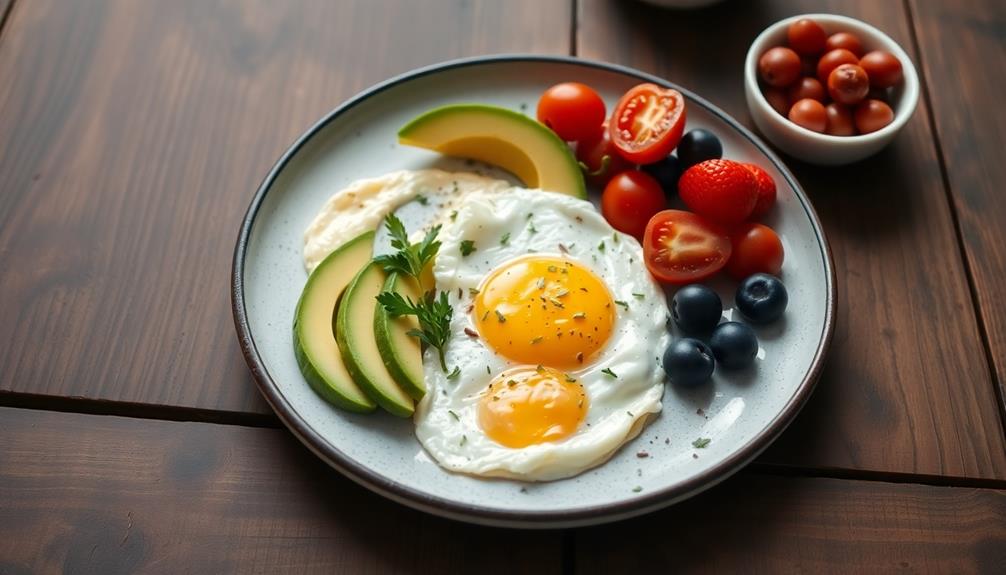
When you're looking for low-carb breakfast options, think about protein-packed smoothies, tasty egg-based dishes, and creative chia seed recipes.
These choices not only keep your carb intake in check but also provide essential nutrients to kickstart your day. Incorporating ingredients like coconut oil for cooking can enhance flavor while supporting your health goals.
Let's explore how these delicious meals can support your health and satisfy your taste buds.
Protein-Packed Smoothie Ideas
Three delicious protein-packed smoothie ideas can kick off your day while keeping your carb intake low. Start with a blend of unsweetened almond milk, Greek yogurt, and spinach. This low-carb protein-packed smoothie provides around 254 calories, 15.1 g of protein, and only 14.6 g of carbohydrates per serving.
For those looking for a quick and flavorful breakfast option, consider exploring Keto Breakfast With Eggs for additional ideas.
For an extra protein boost, add protein powder, which helps with satiety and blood sugar stabilization. Another option is to incorporate low-glycemic fruits like berries; 75 g of blueberries, for instance, adds about 14 g of carbohydrates while offering fiber benefits.
Don't forget about healthy fats! Including ingredients like avocado or chia seeds can enhance the nutritional profile, providing beneficial omega-3 fatty acids without upping the carb count.
If you want to sweeten your smoothie, opt for natural alternatives like stevia to maintain low sugar levels.
These protein-packed smoothie ideas not only support diabetes management but also deliver essential nutrients to keep you energized throughout the morning. Enjoy experimenting with these ingredients to create your perfect low-carb breakfast!
Tasty Egg-Based Dishes
Eggs make a fantastic addition to your breakfast lineup, especially when you're looking for low-carb options. They provide about 6.3 grams of protein and only 71.5 calories per large egg, making them an excellent choice for managing blood sugar levels.
You can whip up a delicious vegetable omelet or frittata, packed with non-starchy veggies to boost the fiber content and overall nutrition while keeping carbs low. If you prefer something quick, try scrambled eggs with avocado. This combination not only offers healthy fats but also helps you feel full longer, reducing cravings throughout the day.
When cooking, consider poaching or sautéing your eggs in olive oil. This method retains nutrients while enhancing flavor without adding excessive carbohydrates.
Incorporating eggs into your breakfast can provide high-quality protein and essential nutrients, supporting your dietary needs without greatly affecting your blood sugar levels.
With so many tasty egg-based dishes to choose from, you'll find it easy to enjoy a satisfying, low-carb breakfast that keeps you energized and on track with your health goals.
Creative Chia Seed Recipes
Chia seeds are a powerhouse ingredient for creating delicious low-carb breakfast options that keep your blood sugar in check. Packed with fiber, just a 28 g serving has 9.8 g of fiber and only 12 g of carbs, making them excellent for blood sugar management.
Additionally, incorporating essential oils like eucalyptus oil can help support overall health and well-being. One of the simplest ways to enjoy them is through chia seed pudding. Combine chia seeds with almond milk and top with berries for a nutritious breakfast that's rich in omega-3 fatty acids and antioxidants.
You can also mix chia seeds into smoothies. A blend of unsweetened almond milk, Greek yogurt, and chia seeds can create a creamy, protein-packed drink with around 254 calories and 15.1 g of protein, perfect for a low-carb breakfast.
Another fantastic option is overnight oats. Chia seeds absorb liquid, creating a delightful texture while adding fiber and protein, which promotes satiety and helps maintain stable blood sugar levels.
If you love baked goods, consider incorporating chia seeds into muffins. This enhances the nutritional value while keeping the carb content lower, supporting your diabetes management efforts.
Enjoy these creative chia seed recipes for a healthy start to your day!
High-Protein Breakfast Ideas

Starting your day with a high-protein breakfast can greatly benefit blood sugar management for diabetics. Incorporating protein into your morning routine helps stabilize blood sugar levels and keeps you feeling full longer.
Here are some delicious high-protein options you can try:
- Greek yogurt: Approximately 20.4 g of protein per 200 g serving.
- Eggs: Around 6.3 g of protein per large egg, affordable and nutritious.
- Cottage cheese: Offers a whopping 38 g of protein per serving.
- Breakfast burrito: Filled with lean protein and veggies, providing 20-25 g of protein.
These high-protein breakfast ideas not only support diabetes management but are also low in carbohydrates, making them ideal choices.
You might enjoy a hearty breakfast burrito packed with eggs and vegetables or a bowl of Greek yogurt topped with berries. If you prefer a plant-based option, consider a tofu scramble, which delivers about 10 g of protein while being low in carbohydrates.
Fiber-Rich Breakfast Choices
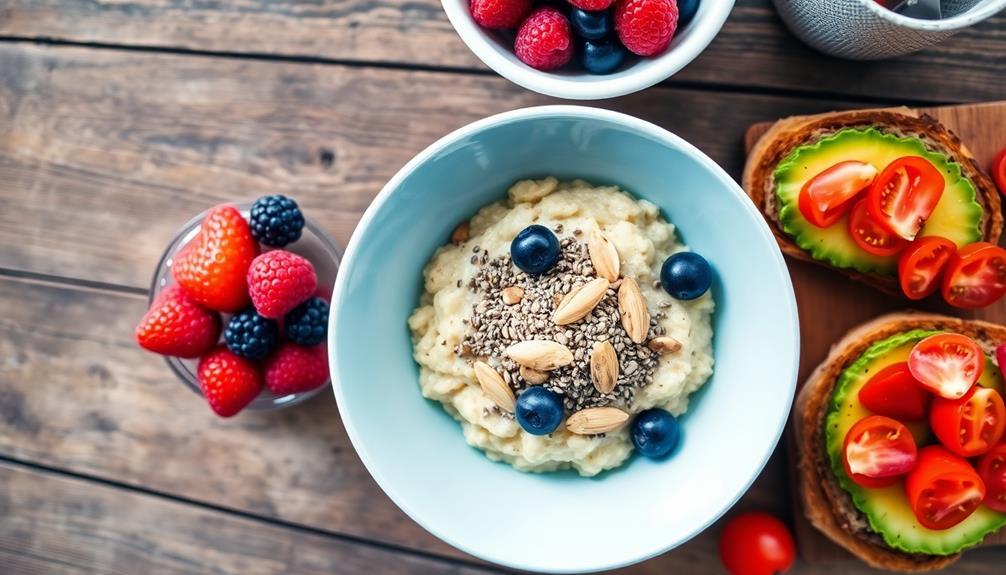
When it comes to managing diabetes, incorporating fiber-rich foods into your breakfast can make a significant difference. Options like oatmeal, chia seeds, and whole grain cereals not only help stabilize blood sugar but also keep you feeling full longer.
Let's explore the benefits of fiber intake, some tasty high-fiber food choices, and simple meal prep ideas to kickstart your day.
Benefits of Fiber Intake
Incorporating fiber-rich foods into your breakfast can markedly benefit blood sugar management and overall health. Fiber plays a vital role in stabilizing blood sugar levels by slowing down carbohydrate absorption.
Here are some of the key benefits of including fiber in your morning meal:
- Helps maintain steady blood sugar levels
- Reduces cravings and promotes satiety
- Supports digestive health
- Enhances overall dietary patterns
For people with diabetes, aiming for 25-30 grams of fiber daily is essential. Foods like oatmeal are particularly beneficial, offering around 27.4 grams of carbohydrates and containing soluble fiber. This type of fiber aids in blood sugar control, making oatmeal a healthy breakfast choice.
Chia seeds are another excellent option, providing about 9.8 grams of fiber per serving, which can help keep you full longer and curb cravings throughout the day.
High-Fiber Food Options
Including high-fiber foods in your breakfast not only supports blood sugar management but also offers a variety of delicious options to kick-start your day.
For instance, oatmeal is a fantastic choice; it contains 27.4 g of carbs and 5.4 g of protein, helping to regulate blood sugar by slowing carbohydrate absorption. You might also consider adding chia seeds to your meal. A 28 g serving provides 12 g of carbs and an impressive 9.8 g of fiber, making it an excellent filling option.
Don't forget to incorporate fruits like blueberries into your breakfast. A 75 g serving contributes about 14.5 g of carbs and 2.4 g of fiber, enhancing your daily fiber intake.
Whole grains, such as wheat bran cereal, also play a crucial role; a typical serving delivers 23.1 g of carbs and 2.9 g of protein while maintaining a low glycemic load.
Regularly enjoying these high-fiber foods can help you meet the recommended daily fiber intake of 25-35 grams. By doing so, you'll promote better blood sugar control and overall digestive health, setting a positive tone for your day.
Meal Prep Ideas
You can easily prepare fiber-rich breakfasts in advance, guaranteeing you start your day off right. By incorporating high-fiber breakfast options into your meal prep, you'll help manage blood sugar levels effectively. Here are some great ideas:
- Overnight oats with whole grains and chia seeds
- Chia seed pudding customized with fruits
- Cottage cheese bowl topped with nuts or berries
- Wheat bran cereal for a quick, nutritious option
Overnight oats are a fantastic choice, combining oats with almond milk and chia seeds for added soluble fiber. Just mix and let them sit overnight, making your morning hassle-free.
Blueberry chia pudding is another nutritious option, packed with omega-3 fatty acids that promote satiety.
Don't forget the cottage cheese bowl! This protein-rich option can be easily customized with fruits or nuts, enhancing your fiber intake.
Healthy Fats for Breakfast
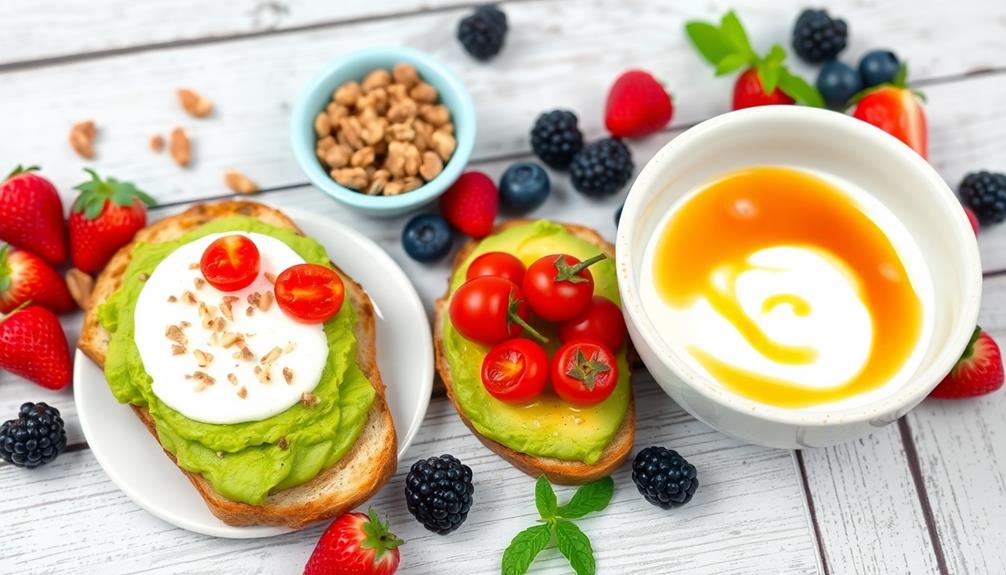
Healthy fats play an essential role in crafting a balanced breakfast, especially for those managing diabetes. Incorporating healthy fats, like those found in avocado and nut butters, not only lowers harmful cholesterol levels but also improves insulin sensitivity. This can notably aid in blood sugar management.
Try spreading unsweetened nut butter on whole-grain toast for a satisfying start to your day. The combination of protein and fat helps stabilize your blood sugar levels and keeps you feeling full longer.
Additionally, including omega-3 fatty acids from sources like chia seeds or fatty fish can reduce inflammation and support heart health, which is crucial for overall metabolic function.
Consider dishes like eggs with avocado on whole-grain toast. This pairing enhances satiety, preventing you from overeating later. Balancing your intake of healthy fats with carbohydrates is essential; olive oil and grass-fed dairy are excellent options that contribute to a nutrient-dense breakfast.
Meal Prep Tips for Convenience

Meal prepping can make your mornings a breeze, especially when you batch cook breakfast items like frittatas or burritos.
You can also freeze individual servings of options like mini muffins or smoothie packs for quick grab-and-go meals.
With a bit of planning and organization, you'll find it easier to stick to diabetes-friendly choices without sacrificing time or variety.
Batch Cooking Strategies
Batch cooking offers a practical solution for busy mornings, allowing you to prepare multiple servings of nutritious breakfasts in advance.
This method not only saves time but also guarantees you have healthy options readily available throughout the week.
Here are some tips to get you started:
- Plan your meals: Choose recipes that incorporate diverse ingredients to keep breakfast interesting.
- Prep ingredients: Chop vegetables for omelets or cook grains for oatmeal ahead of time.
- Cook in bulk: Prepare larger quantities of your favorite dishes to manage portion sizes effectively.
- Store wisely: Use portion-controlled containers for easy access and tracking of carbohydrate intake.
Freezable Breakfast Options
Preparing meals in advance can greatly ease your morning routine, especially when it comes to making nutritious choices. Freezable breakfast options like quiches and muffins can be made ahead of time, ensuring you have healthy meals ready to go on busy mornings.
Consider making chia seed pudding or overnight oats in bulk; both are rich in fiber and healthy fats, providing a satisfying start to your day.
Breakfast burritos filled with eggs, vegetables, and lean proteins are another great protein-rich, low-carb option. Wrap them up and freeze for a quick reheatable breakfast that helps stabilize blood sugar levels.
Mini frittatas packed with vegetables and low-fat cheese can also be prepped in advance, offering a nutritious breakfast that supports diabetes management.
To keep your meals interesting, incorporate a variety of ingredients such as fruits, nuts, and whole grains into your batch-cooked breakfasts. This not only enhances flavor but also boosts the nutritional value, ensuring you enjoy a balanced breakfast that fuels your day and maintains your health.
With these freezable breakfast options, you're set for success!
Quick Assembly Ideas
A few simple strategies can make your breakfast routine much more convenient. By prepping ahead, you'll enjoy healthy breakfast options that require quick assembly during busy mornings. Consider these ideas:
- Prepare overnight oats or chia seed pudding the night before for a quick, nutritious start.
- Batch cook vegetable frittatas or turkey sweet potato hash for ready-to-eat meals throughout the week.
- Portion out Greek yogurt with berries or cottage cheese with nuts for balanced nutrition on the go.
- Freeze breakfast items like banana nut muffins or breakfast burritos for easy reheating.
These tips not only save time but also guarantee you're sticking to low-carb, diabetes-friendly meals.
With a little effort, you can set yourself up for success by minimizing morning prep. Eggs, whether scrambled or made into an omelet, can be prepped in advance, offering flexibility and deliciousness.
Flavor Enhancement Techniques
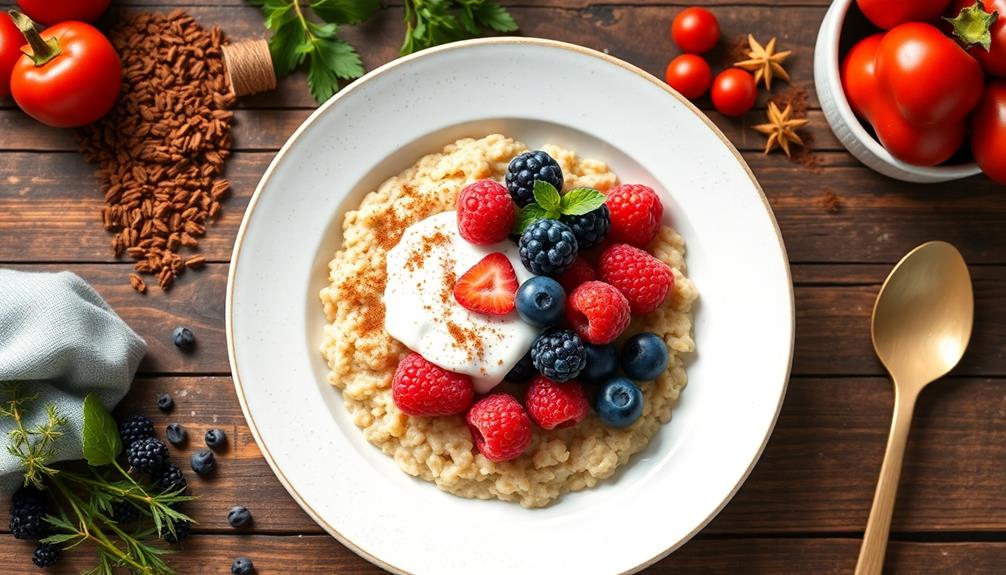
When it comes to jazzing up your breakfast, flavor enhancement techniques can make all the difference without compromising your health. By experimenting with herbs and spices like cinnamon or turmeric, you can boost flavor without adding calories or sugar. These spices not only enhance taste but also offer potential health benefits.
Consider using citrus zest from lemons or oranges to brighten up oatmeal or yogurt bowls. This adds a burst of flavor and a healthy dose of vitamin C. Incorporating vanilla extract or almond extract into smoothies or baked goods introduces natural sweetness and depth, keeping your meals satisfying while maintaining stable blood sugar levels.
Roasting vegetables for omelets or frittatas is another fantastic technique. This caramelizes their natural sugars, enhancing flavor and keeping your meals nutritious with a low glycemic impact.
Finally, don't overlook high-quality cooking oils like extra virgin olive oil. They not only improve flavor but also provide healthy fats that support heart health and promote satiety.
With these flavor enhancement techniques, you can enjoy delicious breakfasts that nourish your body while managing your blood sugar effectively.
Managing Portions and Carbohydrates
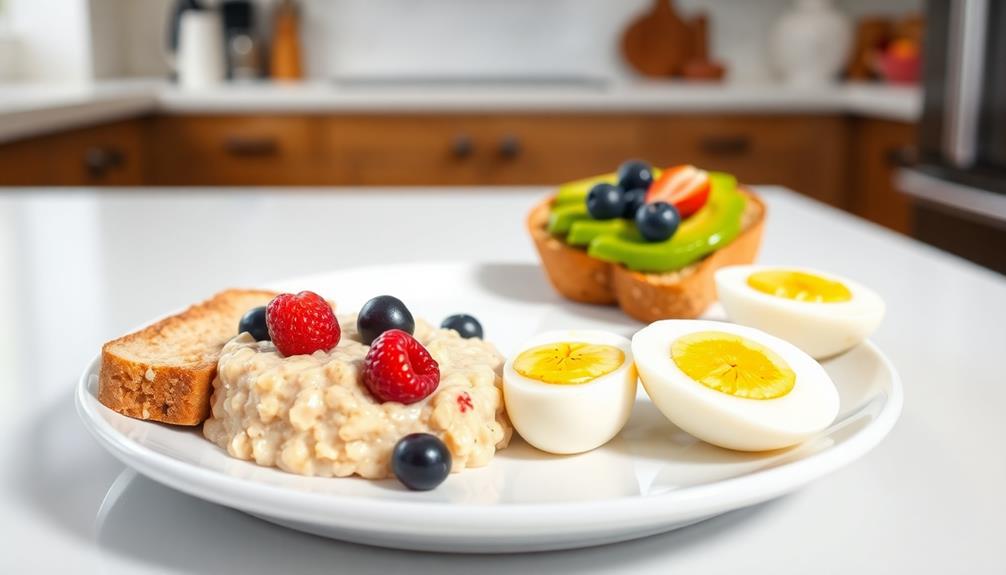
Managing portions and carbohydrates is vital for keeping your blood sugar levels stable. By practicing portion control, you can effectively manage your meals and avoid blood sugar spikes. Aim for 45-75 grams of carbohydrates per meal, and incorporate fiber-rich foods to help slow absorption.
Here are some tips to take into account:
- Fill half your plate with non-starchy vegetables.
- Dedicate a quarter of your plate to lean protein.
- Reserve the remaining quarter for healthy carbohydrates, like whole grains.
- Choose cereals with at least 5 grams of fiber and no more than 15 grams of carbohydrates per serving.
Incorporating these strategies not only aids in stabilizing blood sugar but also guarantees you're enjoying balanced meals. Aiming for a daily fiber intake of 25-30 grams is vital for diabetics, so load up on those fiber-rich foods!
Monitoring portion sizes, especially for carbohydrate-rich options, will help prevent overeating. By mastering portion control, you empower yourself to make better choices and enjoy meals that support your health while managing diabetes effectively.
Frequently Asked Questions
What Is the Best Breakfast for a Diabetic to Eat?
The best breakfast for you includes scrambled eggs with veggies, Greek yogurt with berries, or oatmeal topped with nuts. These options balance protein, fiber, and healthy fats, helping you maintain stable blood sugar throughout the morning.
What Is the First Thing a Diabetic Should Eat in the Morning?
When morning breaks, you should kickstart your day with protein-packed eggs or a creamy Greek yogurt with berries. These choices dance gracefully on your taste buds while keeping your blood sugar steady and satisfied.
What Breakfast Does Not Spike Blood Sugar?
To avoid spiking your blood sugar, choose breakfasts rich in protein and fiber, like scrambled eggs or Greek yogurt with berries. Incorporating healthy fats, such as avocado, also helps maintain stable blood sugar levels.
What Foods Lower Blood Sugar in the Morning?
To lower blood sugar in the morning, focus on high-fiber foods like oatmeal, protein-rich eggs, and low-fat Greek yogurt with berries. Incorporate whole grains and non-starchy vegetables for added nutrients and stable levels.
Conclusion
Incorporating a healthy breakfast is essential for managing diabetes, as studies show that eating a balanced meal in the morning can lower blood sugar levels by up to 25%. By focusing on low-carb, high-protein options, and healthy fats, you're setting yourself up for a successful day. Don't forget to prep in advance for convenience, and use flavor enhancements to keep your meals exciting. Remember, small changes can make a big impact on your health!

